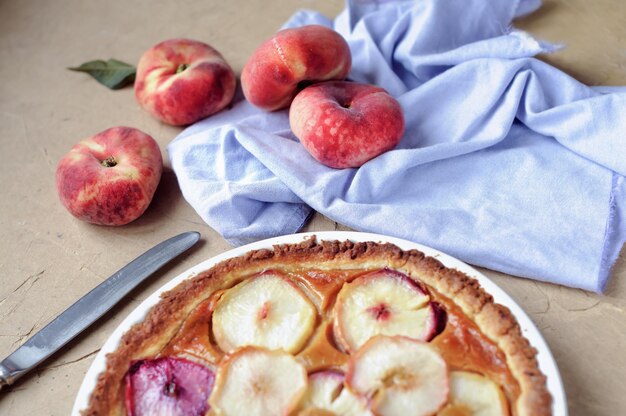Should You Refrigerate Your Apple Pie? A Comprehensive Guide to Extend Its Freshness 🍏🥧
Nothing beats the comforting aroma of a freshly baked apple pie wafting through the kitchen. It's a timeless classic that graces tables during holidays, family gatherings, and casual afternoons. But once the pie has been sliced and savored, a common question arises: Should apple pie be stored in the refrigerator? Let's delve into this topic to ensure your apple pie stays as delicious as the day it was baked.
Why Storage Matters: The Science Behind It
Storing food correctly is essential to maintaining its quality and ensuring safety. Understanding the science behind food storage helps you make informed decisions for your apple pie.
The Role of Temperature
Temperature plays a crucial role in food preservation. Room temperature can promote the growth of bacteria and fungi if leftover food is not stored properly. This risk is especially relevant for moist desserts like apple pie, which can be susceptible to spoilage if left out too long.
How Refrigeration Keeps Food Safe
Refrigerating food helps slow down the growth of microbes, prolonging the freshness of your apple pie. By keeping your pie chilled, you minimize the risk of spoilage, helping it stay safe and delicious for as long as possible.
Different Types of Apple Pie and Their Storage Needs
Not all apple pies are created equal. Depending on the ingredients and preparation method, storage needs can vary. Here’s a closer look at some popular types of apple pies and how you should store them.
Traditional Apple Pie
A classic apple pie usually consists of a buttery crust and apple filling seasoned with cinnamon, sugar, and nutmeg. For a short duration, a traditional apple pie can remain at room temperature. However, storing it in the refrigerator is advisable if you plan to keep it for more than two days.
Custard Apple Pie
If your apple pie contains custard or cream, such as a Dutch apple pie with a crumbly topping, it's best to refrigerate it immediately after cooling. These ingredients are prone to spoiling more rapidly at room temperature.
Sugar-Free Apple Pie
Health-conscious bakers often opt for sugar-free alternatives, which might affect the shelf life. Without sugar, which acts as a preservative, these pies generally require refrigeration to prevent spoilage.
Crumb-Topped Apple Pie
Crumb-topped pies offer a delightful crunch and additional flavor but can become soggy if stored incorrectly. Storing them in the refrigerator helps maintain their texture and taste.
How Long Can Apple Pie Last?
The longevity of an apple pie depends on how it's stored. Below is a general guideline for maximum freshness:
- Room Temperature: Up to 2 days for most apple pies.
- Refrigerated: 4 to 5 days for best quality.
- Freezer: Up to 4 months when wrapped properly.
Practical Steps for Storing Apple Pie
Now that we've outlined the importance of refrigeration let's explore practical steps you can take to store your apple pie effectively.
Room Temperature Storage
If you plan to eat your apple pie within a day or two, cover it lightly with aluminum foil or plastic wrap and keep it on the counter.
Refrigerating Apple Pie
- Wrap It Up: Use plastic wrap or aluminum foil to cover your pie. This helps retain moisture and prevent refrigerator smells from seeping into your dessert.
- Use an Airtight Container: For additional protection, place the wrapped pie in an airtight container.
Freezing Apple Pie
For long-term storage, freezing is the best option:
- Cool Completely: Ensure your pie is completely cool before wrapping.
- Wrap and Seal: Use a double layer of plastic wrap or aluminum foil. Follow up with a freezer bag for extra insulation.
- Label It: Use a label to mark the date. Frozen pies should maintain quality for up to four months.
Signs Your Apple Pie May Have Spoiled
No one wants to waste a good pie, but it's essential to recognize when your dessert is past its prime.
- Off Smell: A sour or unpleasant odor is a clear indicator of spoilage.
- Mold Growth: Obvious spots of mold should prompt immediate disposal.
- Change in Texture: If the crust becomes overly soggy or the filling separates and becomes watery, consider it a sign of decline.
Tips for Reheating Your Apple Pie
Reheating your refrigerated or frozen pie can restore some of its original texture and taste.
Oven Method
- Preheat Oven: Set your oven to 350°F (175°C).
- Cover and Heat: Cover the pie with aluminum foil to prevent over-browning of the crust. Heat for 10 to 15 minutes for a refrigerated pie, and 25 to 30 minutes if frozen.
Microwave Method
For a quick option, the microwave works but may not preserve the crust's crispness.
- Slice and Heat: Heat individual slices on a microwave-safe plate for 30 seconds to 1 minute.
The Verdict: To Refrigerate or Not?
Ultimately, storing your apple pie in the refrigerator is a smart choice if you want to maintain its quality and avoid any food safety issues. While an apple pie can last for a short time at room temperature, refrigeration extends its freshness. This is especially important if your pie contains ingredients prone to quicker spoilage, like cream or custard.
Summary: Apple Pie Storage Tips 📦
- Refrigerate traditional apple pies if keeping them for more than 2 days.
- Custard or cream pies should always be refrigerated.
- Freeze apple pies for up to 4 months for best preservation.
- Check for spoilage: smell, mold, and texture changes are key indicators.
- Reheat smartly: prefer oven methods to maintain texture.
With these insights and tips, you're equipped to enjoy every last bite of your apple pie, whether it's freshly baked or savored days later. Happy pie-eating! 🥧✨

